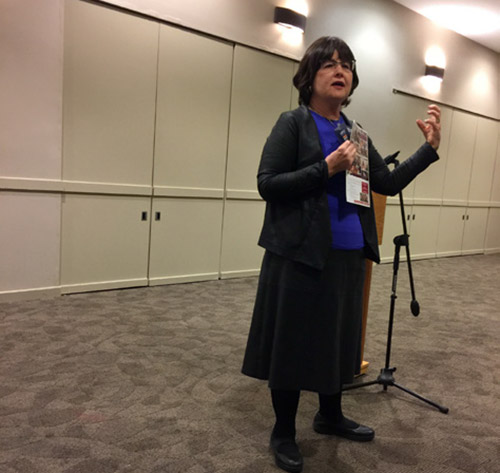


Setting the stage for the upcoming celebration of the 50th anniversary of the unification of Jerusalem, Matan, Israel’s groundbreaking Torah study institute for women, hosted a morning Yom Iyun at Congregation Rinat Yisrael on Sunday, May 7. Attendees included many enthusiastic former students of Matan’s gap-year program, Midreshet Torah V’Avodah (MTVA).
Participants were honored by the presence of three outstanding talmidot chachamot who stand at the helm of Matan. Rabbanit Malke Bina, founder of Matan; Rabbanit Shani Taragin, key educator and director of Matan’s Morot L’halakha and Eshkolot programs; and Rabbanit Yael Leibowitz, Tanach educator for adults.
In welcoming the audience, Rabbanit Bina expressed her gratitude to the Teaneck community and specifically Rabbi Adler for allowing Matan to continue in the spirit of Yom Hazikaron and Yom Ha’atzmaut, and the upcoming celebration of Yom Yerushalayim, with serious Torah learning.
Rabbanit Bina took the opportunity to introduce two new innovative programs in addition to the ongoing Beit Midrash programs throughout the country. The Morot L’halakha program, initiated in 2016, was created for leaders and professionals who will live and serve as halachic experts in the center of the country and the periphery. Graduates will be versed in the broad areas of Halacha that relate to women at various stages of their lives. The program is run by Rabbanit Oshra Koren, director of Matan HaSharon, and Rabbanit Taragin, who created and supervised curriculum development.
Last August, another program was launched. Sixteen superstars began the Bellows Eshkolot program, whose goal is the enhancement of Tanach and Jewish studies in Jewish schools by providing the unparalleled opportunity to delve into the study and pedagogy of Torat Eretz Yisrael while concurrently earning an MA in Jewish education at Hebrew University. Participants returning to teach in North America are eligible for a generous tuition scholarship and living stipend. Directors of the program are Dr. Dodi Tobin and Rabbanit Taragin. Serving as rector is Dr. Bryna Jocheved Levy.
Now finishing the fourth year of its five-year program, Matan’s Hilkhata Institute, headed by Rabbanit Rachelle Sprecher Fraenkel, is training 13 exceptional women to become meshivot halacha—halachic responders. This pioneering institute makes a quantum leap in women’s learning, providing the tools that enable the students to serve as inspirational leaders in their communities and respond to halachic questions.
During the morning program, Rabbanit Taragin, true to her engaging teaching style and exemplary erudition, took the audience on a scholarly search for the origins of Yerushalayim being the “chosen” city throughout Tanach. Barely mentioned in Torah, the Nevi’im and Ketuvim hone in on “the place” and identify it with Yerushalayim. Perhaps because of its geographic neutrality, its status of being unconquered and its ability to unite the sons of Rachel and Leah it was selected as the “home” base of the Jewish people. The holiness of Yerushalayim was established when the people expressed their yearning for it, sought it out and chose it to be the center of their governmental and spiritual life.
Rabbanit Leibowitz, whose husband Rabbi Aaron Leibowitz served as the rabbinic intern at Congregation Rinat Yisrael before the family made aliyah, elaborated upon several thematic approaches to Biblical stories from which one can learn about the civilizations preceding our history that shed light upon our own. The theme of “the deeds of the Fathers are a signpost to the children” allowed our ancestors to provide a blueprint for us to help us understand our history. The recurrent theme of the younger sibling overtaking the elder exemplifies how Hashem compensates for youth with chosenness. The phenomenon of the barrenness of the mothers of our great leaders foreshadows our history as a nation conceived in the barrenness of the Sinai desert. The supportive roles played by women in tandem with our national heroes, such as Zipporah the wife of Moshe, the midwives in Egypt and Naomi alongside Ruth, are themes that assist us in understanding the elevation of women in our history. Leading us into Yom Yerushalayim, Leibowitz shared the photograph of an Israeli soldier in 1948 whose numbered arm supported an aimed rifle, his face reflecting determination and courage.
To learn more about Matan’s two exciting summer programs, the Matan Summer Experience, July 2-20, and the Matan’s Advanced Tanakh Summer Institute, July 9-20, visit www.matan.org.il, email summer@matan.org.il or call 02-594-4555.
By Pearl Markovitz









